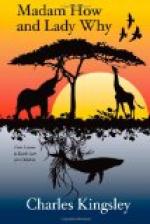Ah, it is gone now. The train runs so fast.
So it does; too fast to let you look long at one thing: but in return, it lets you see so many more things in a given time than the slow old coaches and posters did.—Well? what is it?
I wanted to ask you a question, but you won’t listen to me.
Won’t I? I suppose I was dreaming with my eyes open. You see, I have been so often along this line—and through this country, too, long before the line was made—that I cannot pass it without its seeming full of memories—perhaps of ghosts.
Of real ghosts?
As real ghosts, I suspect, as any one on earth ever saw; faces and scenes which have printed themselves so deeply on one’s brain, that when one passes the same place, long years after, they start up again, out of fields and roadsides, as if they were alive once more, and need sound sense to send them back again into their place as things which are past for ever, for good and ill. But what did you want to know?
Why, I am so tired of looking out of the window. It is all the same: fields and hedges, hedges and fields; and I want to talk.
Fields and hedges, hedges and fields? Peace and plenty, plenty and peace. However, it may seem dull, now that the grass is cut; but you would not have said so two months ago, when the fields were all golden-green with buttercups, and the whitethorn hedges like crested waves of snow. I should like to take a foreigner down the Vale of Berkshire in the end of May, and ask him what he thought of old England. But what shall we talk about?
I want to know about Coprolites, if they dig them here, as they do at Cambridge.
I don’t think they do. But I suspect they will some day.
But why do people dig them?
Because they are rational men, and want manure for their fields.
But what are Coprolites?
Well, they were called Coprolites at first because some folk fancied they were the leavings of fossil animals, such as you may really find in the lias at Lynn in Dorsetshire. But they are not that; and all we can say is, that a long time ago, before the chalk began to be made, there was a shallow sea in England, the shore of which was so covered with dead animals, that the bone-earth (the phosphate of lime) out of them crusted itself round every bone, and shell, and dead sea-beast on the shore, and got covered up with fresh sand, and buried for ages as a mine of wealth.
But how many millions of dead creatures, there must have been! What killed them?
We do not know. No more do we know how it comes to pass that this thin band (often only a few inches thick) of dead creatures should stretch all the way from Dorsetshire to Norfolk, and, I believe, up through Lincolnshire. And what is stranger still, this same bone-earth bed crops out on the south side of the chalk at Farnham, and stretches along the foot of those downs, right into Kent, making the richest hop lands in England, through Surrey, and away to Tunbridge. So that it seems as if the bed lay under the chalk everywhere, if once we could get down to it.




